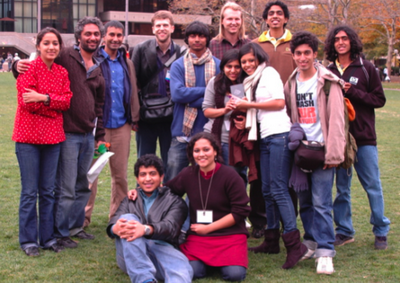Bangalore design students dazzle at MIT synthetic biology competition
A team of students from Bangalore’s Srishti School of Art, Design and Technology were judged to have made the “Best Presentation” at the prestigious International Genetically Engineered Machines (iGEM) Competition, held on Monday, November 2nd at the Massachusetts Institute of Technology. At iGEM, undergraduate teams from around the world compete to build innovative genetic devices in living cells, applying synthetic biology to solve problems in areas such as environment, energy, health, and foundational research. Srishti’s team of design students included: Akash Hirosh, Avni Sethi, Dhruv Nawani, Gautam Vishwanath, Krupakar Dhinakaran, Neha Bhat, Nikhil Patil, Sandeep Mathew, Sanya Rai Gupta, and Upasana Simha. They were mentored by Yashas Shetty, an artist-in-residence at the Centre for Experimental Media Arts (CEMA), Dr. Mukund Thattai of NCBS/TIFR, and Navneet Rai, an NCBS PhD student. Describing themselves as “outsiders” in a competition dominated by engineers and scientists, the team’s project was a unique experiment in art-science collaboration: to construct bacteria which would synthesize geosmin, the substance responsible for the emotive smell of freshly ploughed earth, or of the first monsoon rains. The team’s prize-winning presentation documented their journey of discovery, as they learned the language and techniques of the life sciences and explored its cultural, ethical, and aesthetic implications. One of the presentation judges simply declared: “This changes the way I think about synthetic biology”.
The ArtScienceBangalore iGEM 2009 team shown in the photo above was: Top, left to right: Avni, Yashas, Mukund, Rich Pell (iGEM judge), Nikhil, Tito Jankowshi (iGEM judge), Gautam. Middle, left to right: Sanya, Uppasana, Dhruv, Krupakar. Bottom, left to right: Sandeep, Neha.
Over 100 teams from 25 countries participated in iGEM 2009. The Cambridge team was awarded the Grand Prize, as well as a prize for the “Best Environmental Project”, while the Stanford team won in the “Health or Medicine” category. India was represented by four teams: Srishti, with their “smell of rain” project; IIT Bombay, who engineered bacterial feedback controllers; IIT Madras,who designed a living lock-and-key device; and Praveen Sahu (IBB Pune), who designed cells based on game theory. Dr. Mukund Thattai (NCBS/TIFR), who has been leading Indian teams at iGEM since 2006, was thrilled with the outcome: “This is the third year in a row that India has picked up an iGEM prize. But what I am most excited about is, for the first time there are multiple teams representing India at iGEM. We must build on this momentum.” Praeen Sahu (IBB Pune) emphasized that IBB’s entry was “totally a student-lead effort.” Dr. Guhan Jayaraman (IIT Madras), felt: “iGEM was a great learning experience, and motivates us to go back to our labs and think out of the box”. Prof. K.V. Venkatesh (IIT Bombay) said: “After participating iGEM, my students appreciate that engineers can contribute a lot in the exciting field of modern biology. We can envisage a future regional iGEM meeting which could take place in India, and attract a broad spectrum of teams.”

Comments
Post new comment